- Home
- Single-sex schools ‘let girls be who they want to be’
Single-sex schools ‘let girls be who they want to be’
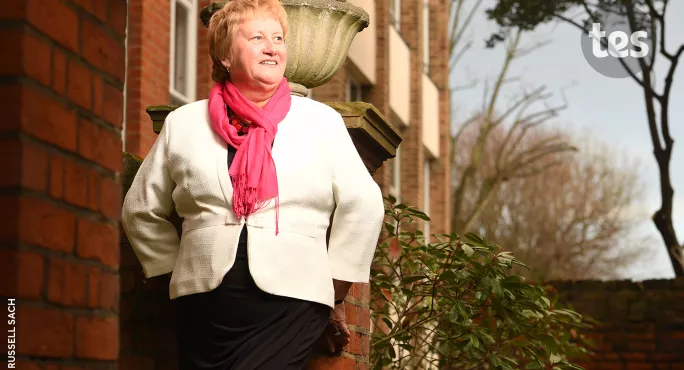
Jane Prescott has a mantra that she believes has served her well throughout her career as a headmistress.
“Rules are for the guidance of wise men, and the obedience of fools,” she says. “You’ve got to be careful with the rules that you have - that they are appropriate, that everybody understands the rationale behind them.”
For Prescott, overly prescriptive approaches to discipline can seem counterintuitive. As head of Portsmouth High School, and the new president of the Girls’ Schools Association (GSA) - a leading body representing private all-girls’ schools in the UK - she has already been vocal in championing technology, praising the use of mobile phones in lessons at a time when many schools impose blanket bans.
Related: Don’t ‘demonise’ mobile phones, schools’ leader urges
GCSEs: Leading head backs less ‘exam driven’ GCSE alternative
Background: Eco-conscious pupils ‘may avoid school trips abroad’
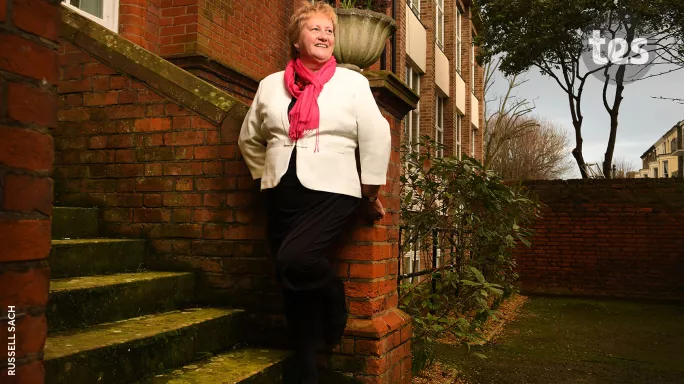
She has spoken about the need to stop “demonising” mobile phones, and instead teach pupils the basics of responsible use. She takes a similar approach to uniforms, arguing that schools that enforce a corporate dress code, or “office attire”, fail to consider the range of careers their pupils might pursue.
“I don’t insist the girls tie their hair up, and I have some very arty girls sometimes in the sixth form, who want to dye their hair an interesting colour,” she says.
“They are expressing their creativity - those that tend to want to have brightly coloured hair tend to be my most artistic. They are likely to go on to careers in the fashion industry or in media - something where you are going to be much more flamboyant in the way you present yourself.
“What is ‘office’? If you are going to work as a barrister you are going to wear a black suit, if you are going to work in theatre, you will look a bit out of place if you turned up in your black suit every day.”
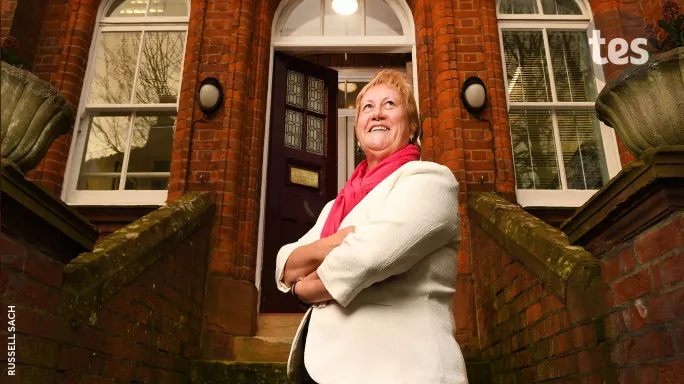
However, her comments on technology use - when she described outright bans on the use of smartphones as “Luddite” - fly in the face of many school policies that demand students turn in phones at the gates. She is careful not to condemn state schools that impose more stringent rules.
“I can’t comment on what it’s like to teach in other schools, state or independent - they’ll all have their unique characteristics, and for some schools, it is better that they have the systems and the rules and regulations that they have. But it isn’t just because this is an all girls’ school that we are able to do it - I think it is about an element of trust,” she says.
She acknowledges that a girls’ private school, with smaller class sizes, may be able to offer a “slightly more relaxed environment” - recently, when she led a food technology class with Year 7, pupils used their phones to research recipes. But, she notes, she had an easily manageable class size of 11.
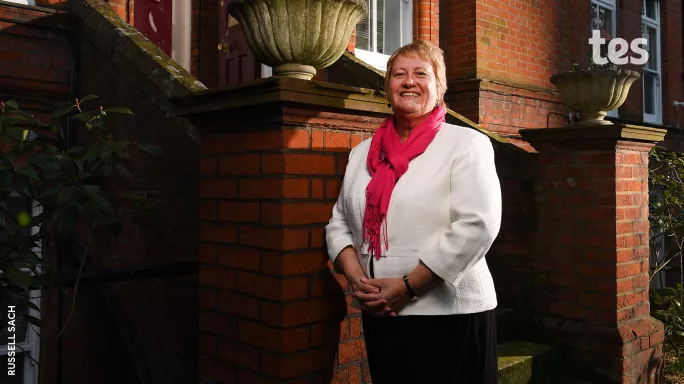
However, Prescott points out she received messages of support about her “enlightened approach” to smartphones from colleagues in the state sector, too.
She clearly has a vision about what education should be. She is keen to discuss how to prepare pupils to become “global citizens,” and speaks passionately of the importance of outdoor learning, citing both the forest school and beach school they have in Portsmouth. The Duke of Edinburgh Award and National Citizen Service are both schemes close to her heart. Moreover, she feels schools must not prioritise exam results at the expense of a broad education.
Yet while teaching is obviously her vocation, she did not find her earliest years in the profession easy.
In fact, after completing her PGCE, Prescott did not teach for several years - her training took place during an upheaval of the exams system, when the government phased out O levels and replaced them with GCSEs, as well as ending the grammar school system, she says.
Despite always knowing she wanted to teach during her upbringing in Norfolk - her father taught engineering at a further education college, and two of her three children are now teachers - Prescott found training at such a tumultuous time uncomfortable.
“I don’t think I ever thought I wasn’t going to be a teacher, from a very, very, early age, that was always my ambition,” she says.
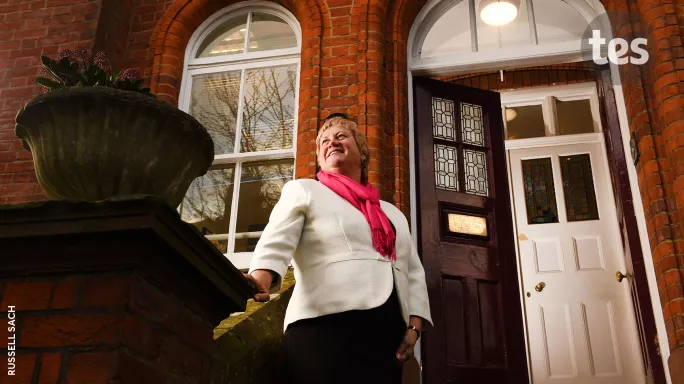
“But it was during my PGCE that I began to question whether I really did want to be a teacher - because it was at the time that grammar schools were being phased out, as well as secondary moderns, and there was this merger to the comprehensive system. And it wasn’t a happy time in education, and I didn’t feel I fitted in anywhere in particular.”
Prescott says the “merger of two very different systems into one system, as a junior member of staff, newly qualified, was quite difficult”. So she left education and joined the army - she had previously been in the TA - where she met her husband, had three children, and was posted overseas, living mainly in Germany.
After her family’s return to England from around a decade abroad and having left the army, she picked up a variety of teaching jobs in further education colleges and secondary schools. But it took a move to teaching in GSA schools to pique her curiosity about fully immersing herself in the classroom once more.
“I really found my passion - I loved teaching in those schools, because I felt for the first time that I was teaching - that it was giving me an opportunity to convey a love of my subject,” she says. “I could get involved in lots of aspects of school life, such as the Duke of Edinburgh Award, lots of trips and visits with children - particularly fieldwork.”
Part of what she found challenging in her previous experience in the classroom was not only changes to the exams system, but the sheer size of many modern comprehensive schools. She describes how “schools were getting larger” and she has enjoyed the ways in which GSA schools represent “the type of place where everyone knows each other, everyone’s very approachable, because nobody’s unknown”.
Free from gender roles
Prescott also notes that, in the case of single-sex schools, girls can be free from the pressure to conform to gender roles - something she herself benefited from as a pupil at a girls’ grammar school. Her sister became a doctor, and she says there was never any sense that maths or sciences were for the boys when they were young.
And it wasn’t just her school that encouraged her to be open-minded about her life. “My mother worked and she never suggested what I might do in the world of work was going to be temporary, because I would have children and give it up and so on,” Prescott remembers.
She wants her pupils to benefit from the same attitude.
“There is no stereotyping [at Portsmouth High School] in the way you might get in other places - the girls can be who they want to be, and I don’t think they ever consider subjects as being male or female. They are just as enthused by English and art as they are by science and maths.”
“It’s also important that we’re not all hard-line feminists, either, in that it is a mixed world in which we live and operate,” she adds.
“It’s about having equal and fair opportunity - no woman would want to get a job just because they are a woman. You want to get that on the same terms as everyone else, and be judged and valued on equal terms. I think in girls’ schools we are very good at making that point - it’s about your strengths and talents.”
Prescott says some of the most inspiring examples of female role models for her pupils have been some of the parents themselves, citing a single parent who established a homeless charity alongside her legal career. She is keen for girls in GSA schools to follow their own path and gain a broad education, and speaks dismissively of “badge-collecting”, in which schools attempt to boost their number of GCSE passes as much as possible, at the expense of pupils’ learning.
“I came out of the league tables because I didn’t want any girl to ever say to me, ‘You don’t want me to do this subject because it will affect where the school is in the tables,’” she says. “That’s the negative of league tables - if schools are only judged on academic results, that pressure can be translated to the pupils who don’t want to let the school down, they see that as a responsibility.”
She plans to introduce a level 2 Higher Project qualification as an alternative independent study course at GCSE, stating: “If we are only exams focused it makes the curriculum very narrow, because you end up teaching to the test, and that’s not good for the broad education, the holistic education that places like this stand for.”
Future of the sector
However, while Prescott is outspoken when it comes to the importance of a broad education, she is cautious of making bold statements regarding the future of private schooling - recently threatened by Labour’s plans to end the sector’s charitable tax status.
Acknowledging the sector has been nervous over its future, she gives a guarded answer.
“I think schools have always got to be agile and ready for change - and we’ve always got to be looking to the next challenge on the horizon to make us active members of our communities and the people that we serve.”
She is keen to point out that the Independent Schools Council has an online calculator where a school’s value to the community can be measured, and that Portsmouth High School’s was approximately £3 million. And she points out that good schools should establish links with the local community because it is their duty, not simply in order to keep charitable status.
Girls in the sixth form volunteer at a school in South Africa, and are active in fundraising for local homeless charities, as well as collecting coats for those sleeping on the streets.
Climate for change
Prescott is especially proud of how some of the changes in school come from the girls themselves - such as the introduction of meat-free Mondays and the banning of single-use plastic bottles.
Unlike some headteachers who marked pupils with an unauthorised absence if they attended global climate protests, she says: “I was quite pleased that they wanted to get involved, that they were interested enough to go along to a rally.
“I think Greta Thunberg has resonated with a lot of them - they can identify with what she’s trying to achieve. They might not always agree wholly with how she’s doing it - but they can’t fail to be impressed with how she’s galvanised a generation to be much more concerned about the environment.”
It is a mark of how much Prescott wants her pupils to see themselves as individuals. You get the sense that conformity is not something she especially prizes as a teacher.
And while she might be wary of the term “hard-line feminist”, Prescott is adamant that GSA pupils should see no ambition as beyond their reach.
“One of my biggest disappointments is when you look at a yearbook and the question is ‘career or children?’ You’d never ask a man that.”
CV: Jane Prescott
1973-80 West Norfolk & King’s Lynn High School for Girls
1980-93 Cardiff University
1983-84 PGCE Cardiff University
1984 Army officer
1994-2005 Leicester High School for Girls - senior mistress
2005-2011 Loughborough High School - deputy head
2011-present Headteacher at Portsmouth High School GDST
2020 GSA president for 2020
Keep reading for just £1 per month
You've reached your limit of free articles this month. Subscribe for £1 per month for three months and get:
- Unlimited access to all Tes magazine content
- Exclusive subscriber-only stories
- Award-winning email newsletters



